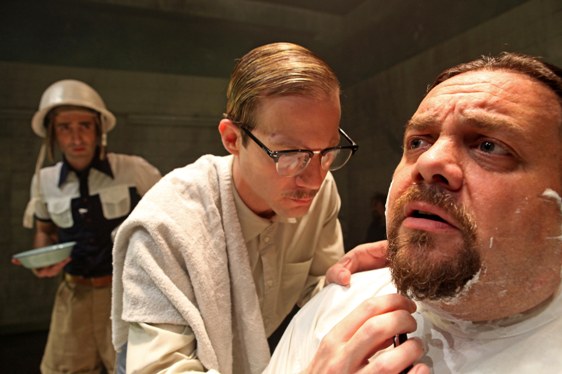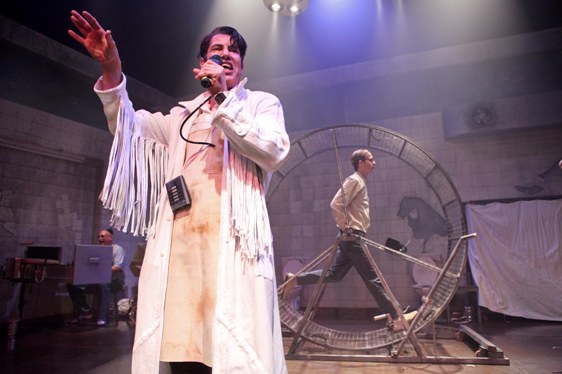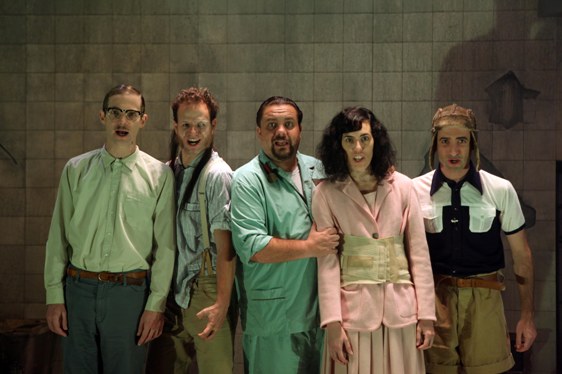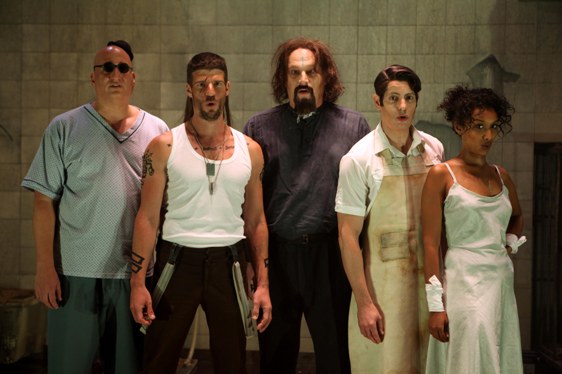
In Itay Tiran’s directorial debut, Woyzeck, Georg Büchner’s (1813 – 1837) indictment of society has a contemporary feel, if it doesn’t rattle the complacency of the audience (as seems to be Tiran’s intention), at least it gets their attention.

The hopelessly impoverished Woyzeck is a soldier who is trying to earn more money by taking on any additional job – performing personal tasks for officers and volunteering for medical “experiments” with a local doctor. His earnings go to Marie, his lover with whom he is raising a child. Pushed to the limits of his physical and psychological endurance, he discovers Marie having an affair with a drum major, and kills her. Yet Büchner’s play, left unfinished at his death, has a story so simple it is almost a non-story. There isn’t really any question of mystery or gradual build-up of suspense.
To the extent that the play is an accusation, it is one that is argued not through proof, but through conveying a certain atmosphere and mood – and it is here that Tiran excels. He creates an environment of madness – playful and unnerving all at once. The play takes place in a gothic insane asylum that has seen better days, with two toilets, a bath complete with cherub spouting water, tiles falling off the greenish-gray walls and a giant hamster wheel.

Tiran’s adaptation and direction situates the play between documentation and entertainment, opening with a quote from Büchner in a letter to his parents, saying, “if there is something that can bring help in our time, it is violence. We know what to expect from our leaders…because we were born and raised in a prison cell, we are not even aware that we are stuck in a pit, our hands and feet tied and our mouths bound shut.” (my own loose translation from the Hebrew version heard last night) Then the entire cast in white straitjackets moves through the song “Misery is the River of the World,” with choreography in which Brecht meets Michael Jackson’s Thriller.

Tom Waits, poet laureate of hard times, with Kathleen Brennan wrote the songs to Robert Wilson’s adaptation of Woyzeck, which premiered in Copenhagen in 2000. The songs (which are available on Wait’s album Blood Money, 2002) as well as the text are translated by Dori Parnes – light, swift and sharp as a dagger. Tiran works effectively with the songs, sound and live music to create a sense of Woyzeck’s external pressures and the collapse of his inner world.

The cast remains onstage throughout the performance, and it’s hard to distinguish the soldiers from the madmen. Tiran is completely transformed (almost unrecognizable) as the subservient Woyzeck, literally shrinking into himself, overtaken by subtle tremors, caught between his two tormentors. Alon Dahan as the officer humiliates and mocks Woyzeck with maniac enthusiasm, all the while mumbling: I’m a good man. The doctor, played by Uri Ravitz, looking a lot like Elvis, with his shock of stiff black hair, leather pants and long white fringes on his lab coat, smirks and flutters his eyes in orgasmic glee as he administers his “treatment” to Woyzeck.

A strong ensemble performance, with Tiran’s emphasis on movement and sound, creates a chilling emotional impact. Tom Wait’s God may be “away on business”, but in this compelling yet grim version, the situation has only deteriorated and “God is on Vacation.”
AYELET DEKEL





